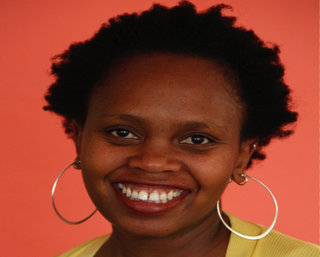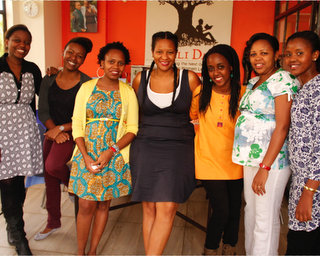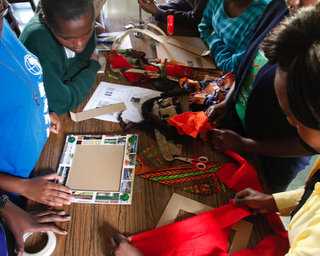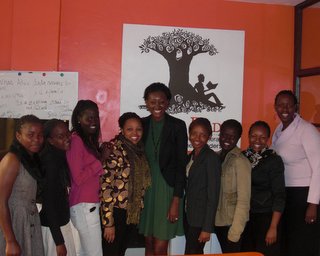Interview of the Month
In addition, Purity is an active member of the feminist and women's rights movement, committed to analysing the private and personal spaces and developing strategies that lead to the emancipation of girls and young women. She is currently an advisory committee member of the FRIDA|The Young Feminist Fund and a 2013 HOW Fund Fellow. In early 2015, she was named as one of the Phenomenal African Feminists to know and watch, so we do just that!
She gracefully speaks to MEWC about her feminist backing, her work in Kenya and her passions for women’s rights:

You have been working in the field of Women’s Rights since 2004, how did you find your way and what were some of your first steps?
When I was in high school, I knew I wanted to be a journalist and one of the things that motivated me to be a journalist was I wanted to visit Afghanistan and cover the then war. I grew up reading all manner of stuff and kept abreast with world politics and happenings of the day. I didn’t see how else I could contribute my voice meaningfully. During my last year of college, I was required to conduct research that linked to any current issue that I felt passionate about. After many days of struggle to find a topic, a friend of mine gave me a book that highlighted cases on violence against women in Kenya. The book had definitions such as ‘what is violence’ ‘types of gender based violence’ to mention a few. For the first time in my life, I found words to name occurrences I had witnessed in my village where I grew up that deeply disturbed me. I was intrigued that there were people working to eliminate such vices like wife battery, female genital mutilation (very rampart in my community) among others. This is what motivated me to apply for an internship at Coalition on Violence Against Women (COVAW). At COVAW where I was attached under the advocacy department. The then Executive Director, Anne Gathumbi made it a point to take me along to high level meetings she attended. That not only helped grow my confidence, it also gave me exposure to current issues and helped me start to form analysis pretty early. One of the very exciting things I did during my internship was to collect over 10,000 signatures to petition the government of Kenya to ratify the Maputo Protocol, (it was eventually ratified in 2010)!
Last month, you were named one of the most Phenomenal African Feminists today, Congratulations! Please tell us about what inspires you personally to fight for gender equality and the empowerment of African women and what are you passionate about at the moment?
I am inspired by life itself to fight for gender equality and empowerment of African women. I strongly believe that women are the hope for this continent and I feel that my contribution to the fight for gender equality is my ‘little thing’- as Wangari Maathai said ‘It’s the little things citizens do. That’s what will make the difference. My little thing is planting trees’- mine is gender equality.
I am inspired by women gone before us; I can’t even imagine how challenging life must have been for them just because of their gender and I am motivated to know that the same way they fought some battles that have made life easier for me, I can do the same to make life easier for those coming after me. I am inspired by the lives of girls and young women I work with; partly because I see so much of my younger self in them and I know had someone, a total stranger not taken a chance on me, I wouldn’t be where I am today. I am inspired by the fact that girls represent so much hope and possibilities for change, I know that investing in a girl is never in vain. Investing in girls not so that they can be good mothers or wives or change societies (all these are by products of investing in girls and young women), but so that they can own their lives, articulate thier voices and make decisions for themselves is my current passion.
As the Executive Director of the awarded and acclaimed Akili Dada, what do you think is the biggest adversary you face in trying to empower women leaders in Kenya?
Women leadership is largely trivialised in Kenya especially because of the underlying systemic gender based discrimination and the largely patriarchal culture we live in. Women and women leaders can be attacked in public and there will be very little outcry from the public save from the Civil Society. The fact that leadership in Kenya is also heavily politicized leaves very little room to showcase women doing incredible things to change this country. In the recent past, there has been lots of talk that we have now ‘over-empowered’ the girls and left out the boys. Such issues can sometimes be very discouraging as it can feel like we’ve been doing this work for too long and very little - in terms of societal perceptions on women and women leadership- has changed. My thought is that empowering girls does not take away in any way from empowering boys because this is not a competition. Empowerment of girls and/or boys are two issues that can be addressed without any taking away from one another.
The women’s movement on gender equality and empowerment has been on the upward trend in Africa in recent times, what is Akila Dada’s contribution to the trend?
Akili Dada is intentionally nurturing and equipping the next generation of African women who will continue the work on gender equality and empowerment. We realise that though it’s a very African thing to pass down information and knowledge through generations, the women’s movement risks losing this because we have very few organised spaces where this happen. Akili Dada has been very intentional in bringing girls and young women into these conversations to ensure that they are aware of the work that’s already been done, and can actively see themselves as players in the movement. We are focused on growing a generation of girls and young women who can articulate the issues that affect them and others.
In your experience, why is it so crucial to empower women and girls at a young age to be engaged in decision-making?
In our African context, girls and women lives are ‘owned’ by their fathers, husbands, brothers or whoever the next male relative is. This means that girls are socialised from a very young age to see themselves as part of another person or to belong to someone rather than to see themselves as independent individuals. This mind frame and socialisation takes a lot of time and effort to break and that’s why its crucial to empower girls and young women at an early age so they can know what they are about, what they are capable of and above all that they actually have a voice and the capability to participate in decision making. In our own observations at Akili Dada, we realised that if a girl has never contested or put herself out there as a prefect, club leader or anything like that, its almost certain that they wont put themselves out for leadership positions in future. In order to change this, we need to invest in them at a young age.

From Left, Joy Zawadi Mwambire Communications Manager, Veronica Thamaini,Director, Young Changemakers Program, Purity Kagwiria, Executive Director, Joyce Ngumba,Director, Innovation in Leadership Program, Julie Wang'ombe,Program Associate and Lead, Gap Year Program, Peninah Ringera,Finance and Administration Manager, Doris Mugambi, Program Associate
What types of programs have been the most successful in urging girls and young women to be changemakers? Why?
The programs I have found most successful are the ones that put girls and young women at the centre of what it is an organisation is doing. Its those programs that show that you care for one particular girl and are invested in her well being- that you are not doing this work to just meet donor obligations or to put fancy photos in a report or because you have nothing better to do but because you care deeply about the people and the cause.
I find that where the implementers are invested personally in the girls and young women’s lives, those girls and young women contribute to incredible change in their communities or settings. I have seen girls literally take a 180 degree turn to change their lives first by believing they can and then working hard towards a goal. I guess its because everyone wants to know that someone cares about them, if you find the balance of good work and caring, you create changemakers.
How important is education in the process of emancipation and empowerment of young women and how does the work of Akili Dada help support this?
Education is power, voice, choice and a very empowering tool. Because the world speaks a certain language when it comes to emancipation and empowerment, its important that girls and young women can speak this language and can be at the table where conversations are taking place. In our modern world, most of that language is acquired through education and that’s why Akili Dada invests in girls and young women from underprivileged backgrounds to get the best education available in Kenya by offering comprehensive high school education scholarships. We realised that women voices, and especially those from underprivileged backgrounds were missing from many decision making process and part of that is due to lack of access to education for this demography of women. Our scholarships are tied in with mentorship and leadership development to ensure that as the girls progress, they start to see possibilities in their lives despite the very difficult backgrounds they come from. Mentorship helps the girls realise that there are others who’ve gone before them and made it, so why not them? The leadership development helps our girls tap into the leaders within them and start leading first by leading self then others.
Akili Dada invests in formal and informal education to give our girls a holistic outlook to life and to enable them find themselves and thrive in whatever circumstances they may find themselves in now and in the future.

Akili Dada High School Club Members Learn on Craftprenuership during a mentoring session
What impact would the liberation of private sphere have on empowering young women?
I believe the personal is political and the private is public. If a young woman is facing challenges in her private sphere, it’s very hard for them to be a liberated person in the public sphere. Therefore the private sphere plays a vital role in how young women and women are perceived and received in public. At Akili Dada we believe and teach ownership and leadership of self which leads to a liberation in the private sphere which translates to the public sphere. We still have a lot of challenges to overcome in the private sphere which I am sure if done, will have a very positive impact in the public sphere and this is what translates to change of attitude and behaviour towards women in the society.
As a young woman, what do you consider as the constraints young women face and strategies that can be employed to enhance their voice in Africa on development and gender equality?
Some of the challenges young women face are:
Lack of mentors - this I think is sometimes because we do not seem to follow our own African version of mentoring and when we do, its clouded with ageism so that the young women are seen as if they have nothing to bring to the table. The strategy here is to define mentoring relationships and give them a timeline; when each party know what’s expected of them, there is more likelihood that the relationship will work out without the young woman being expected to pay homage.
Nothing comes easy- young women and young people in general can sometimes approach spaces feeling like they are owed something and that its someone else’s job to make space for them. While there is lots of truth about making space for others to join in, one cannot be forced to take that space and sometimes you may need to do a bit of work to get into and stay in the space. So I would say that young women need to realize that in the process of earning your seat at the table-even though there are only women on that table- you need to know that sometimes nothing comes easy and be willing to work for it.
Life trajectory- the societal expectations on young women are too demanding; a young woman is expected to be married at a certain age and have children within a certain period of time. This can sometime cause disillusionment and young women end up choosing to let go of their dreams to pursue ‘family life’. We need to teach young women that its okay to want more out of life, and to choose yourself and what you’d want first before thinking of all these demands that the society has on you.
Finally, what kinds of opportunities need to be available in order to women to benefit from full engagement in leadership positions in Africa?
These opportunities can include but are not limited to the following:
Recognizing women’s double roles and contributions in the productive and reproductive sphere and allowing them to be seen contribution to the leadership of Africa. That way, women will always be in leadership because we know women make the world go round in the roles they play in the reproductive sphere.
Making necessary adjustment so that women do not always feel like they have to choose between being in public leadership and their families. For many women in leadership, when something e.g. a scandal happens, their first instinct is to quite the leadership position to spare their families the anguish that comes with public scrutiny. In this regard, women can also work on growing a thick skin to withstand attacks and continue leading forward.
Networks and girls ‘clubs’- as women, we need to constantly work to sponsor each other into leadership and to leave the door open or the ladder down for someone else to climb up. Women do this very well but we are overshadowed by the fallacy that ‘women are their worst enemies’. We need to be intentional about investing in each other and ensuring that we are bringing each other along as we go- because if nothing else, there is security in numbers.
Our Execurive Director with Akili Dada Founder, Dr. Wanjiru Kamau-Rutenberg and Akili Dada Scholars.
You can find Purity Kagwiria @pruncie
You can find Akili Dada @akilidada

